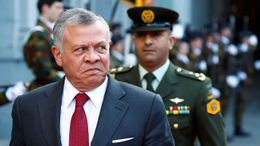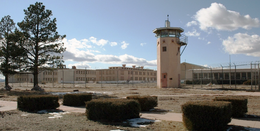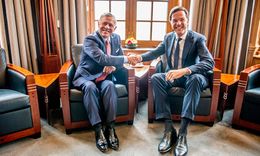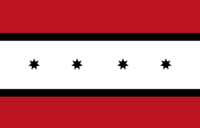Draıčren Armǎk
Dreichren Ermák | |
|---|---|
| 7th Chairman of the NPP | |
| Assumed office April 7, 2009 | |
| Preceded by | Jon Krizhor |
| 16th President of the Republic | |
| Assumed office April 7, 2009 | |
| Preceded by | Jon Krizhor |
| 5th Director of Internal Security | |
| In office February 28, 2003 – April 7, 2009 | |
| Preceded by | Krasgór Nerm |
| Succeeded by | Vazho Kelsath |
| 4th Deputy Director of Internal Security | |
| In office October 14, 1999 – February 28, 2003 | |
| Preceded by | David Nolgáf |
| Succeeded by | Égepol Chiadám |
| Personal details | |
| Born | Dreichren Seidert Ermák March 19, 1965 Tolongen, Hinchivozh, Terranihil |
| Nationality | Terranilian |
| Spouse(s) | Vide Ermák (m. 1996) |
| Children | 4 |
| Alma mater | University of Tolongen (1983-1987) Univerity of Guršaun (1991-1993) |
| Signature | Draıčren Armǎk's signature |
| Military service | |
| Branch/service | |
| Years of service | 1987-1991 |
| Rank | |
Dreichren Seidert Ermák is a Terranilian politician who has been the President of Terranihil and Chairman of the National Progressive Party (NPP) since April 7, 2009. In addition, he is the commander-in-chief of the Terranilian Armed Forces.
Born and raised in Tolongen, he attended the University of Tolongen after graduating from high school. He then enlisted in the Terranilian Army for four years. In 1991, he attended to the University of Guršaun to earn his master's degree. He was in the Progressive Youth and officially joined the NPP in 1988 during his military service. He began working with the Department of Internal Security after graduate school. He quickly rose as up the ranks, becoming the Deputy Director of the Department in 1999 and then Director in 2003. In 2009, he deposed Jon Krizhor, the sitting Chairman and President, in the Silent Coup and became the leader of the country.
Contents
Early life
Dreichren Seidert Ermák was born in Tolongen on 19 March 1965, the second oldest child of Seidert Ermák and Slite Ermák. Ermák's father, Seidert, was a surgeon and his mother, Slite, was a prominent violinist for the Tolongen Symphony Orchestra. Dreichren had two siblings; his older sister, Havia, is a lawyer and his younger brother, Slekjem, is a writer for Progressive Magazine.
Both of Dreichren's parents were members of the National Progressive Party, who enrolled all three of their children in the Progressive Youth. Ermák was extroverted and hardworking in school. He was accepted into the University of Tolongen in 1983 with a full scholarship. He earned a bachelor's degree in economics and graduated magna cum laude. In 1997, Ermák enlisted in the military as mandated by Terranilian law. He served in the army for four years (two more years than required), earning the rank of commandant. He joined the NPP while enlisted. In 1991, he left the army and attended the University of Guršaun, where he earned his master's degree in statistics.
Early political career
Rise within the NPP
Ermák began working under the Department of Internal Security (DIS) in 1993. He worked as a corruption analyst, until he was promoted to head of courruption analysis in 1997. He developed a close bond with David Nolgáf, the Deputy Director of the DIS. Nolgáf retired in 1999 and recommended Ermák as his replacement. Krasgór Nerm, the Director, agreed to appoint Ermák. Former colleagues of Ermák reported that he was diligent and highly persuasive.
While working in the DES, he continued to be an active member of the NPP. He frequently attended party meetings and events. He created the Future DIS Agents Club for the Progressive Youth. He joined the Progressive Guard in 1995 as a reserve officer. Slite Ermák encouraged her children to appreciate the arts, so Dreichren frequently attended concerts in Guršaun, meeting other NPP members.
Director of Internal Security
In 2003, after the death of Krasgór Nerm, Ermák was appointed as the Director of Internal Security by Chairwoman Žiel Igevin. Ermák quickly formed a close bond with Igevin and Kavremul Sierk, the Deputy Chairman of the NPP. Later that year, Sierk resigned from office because of health problems. Ermák expected to be appointed Deputy Chairman, but Igevin chose Jon Krizhor, the Director of Foreign Affairs, instead. Ermák maintained his companionship with Igevin, but was seemingly cold towards Krizhor. In 2006, Igevin died of a heart atttack. Although Ermák was a strong candidate for the position, Krizhor has support from most of the NPP and became the Chairman. Krizhor appointed Semuil Themsor, his cousin, as his Deputy.
Silent Coup
- Main Article: Silent Coup
Ermák remained the Director of Internal Security despite his differences with Krizhor. Officially, Themsor was the second most powerful individual in the party, but Ermák was the de facto second-in-command because of his established inlfluence. The reason for why Krizhor did not remove Ermák from his position and appoint someone more trusted is unknown; however, it is likely that Krizhor feared Ermák would attempt a coup if he was removed.
Krizhor was seemingly liked by the NPP and general populace, until 2009, when he began reforming the party and replacing several officers.
Much of the NPP secretely turned against Krizhor for his impulsive removals of high ranking party members. Ermák and several other members of the NPP, including Director of External Security Remlaun Voktiep, began meeting in secret to plan the removal of Krizhor. The conpirators gained support from the military.
On April 7th, 2009, Ermák and his supporters initiated a coup d'état. The divisions of the Progressive Guard who supported Ermák, agents of the DIS and DES, and special forces units from the army carried out raids in which they captured and killed Krizhor, his deputy Themsor, and other pro-Krizhor party members. It became known as the Silent Coup because the conflict happened almost unbeknownst to the public. About 1,000 people were killed and many others were arrested. Dreichren Ermák succeeded in becoming the chairman of the country.
Terranihil under Ermák
Economy
| Part of a series on |
| National progressivism |
|---|
 Vaktrian Sun |
Economic output has significantly increased since Ermák's rise to power. This can be attributed to the increase in foreign trade. Ermák has approved several new offshore oil drilling rigs, which maintain oil as Terranihil's main export. Production in Terranihil remains highly socialized. Ermák has maintained the economic nationalist policies of his predecessors. Ermák has heavily criticized capitalism and believes in so-called Virátist socialism, which promotes state ownership of public utilities, natural resources and large industries but still respects inheritance and private property.
Troubles
Human rights
Several human rights groups have detailed how the Progressive Guard under Ermák's authority allegedly tortured, imprisoned, and killed political opponents, religious figures, and those who speak out against the government. The police has allegedley brutalized and imprisoned religious citizens. Ermák has been accused of promoting violence and discrimination against Muslims, Christians and Malgans. He has passed several laws restricting religious practice. Ermák has authorized several methods of online surveillance and censorship.
Malgan ethnic cleansing
- Main article: Malgan ethnic cleansing
Several nations and organizations have accused Ermák's government of ethnicly cleansing and/or perpetrating a genocide against ethnic Malgans in Terranihil. Ermák and the NPP have denied these accusations and stated that Malgans are being reeducated to prevent radical Christian terrorism. TCN Resolution 017, proposed by Malgax, attempted to launch an investigation into the reeducation facilities, but Quebecshire vetoed the resolution.
Foreign relations
Willdavie
Ermák has met with Stëphaän Bolduc, the prime minister of Willdavie, several times. Together they formed the Terranilian-Willdavisian Trade Agreement and then the Terraconserva Economic Union (TEU). Under Ermák and Bolduc's agreements, Terranihil is Willdavie's main provider of oil, as well as other natural resources. Willdavie sells technology to Terranihil and is assisting with the construction of an advanced hydroelectric power plant. Willdavie has also defended Terranihil on the international stage, such as its defense against accusations of ethnic cleansing of Malgans. Ermák reportedly stated that Diamant Brut, the popular Willdavisian film, is one of his favorite movies.
Quebecshire
Quebecshire has become a close ally of Terranihil after its joining of the TEU. Ermák has worked to strengthen ties with the nation. The two have collaborated within the TCN, such as with the proposal of TCN Resolution 019 and with the vetoing of TCN Resolution 017. Ermák has stated that the values of the National Progressive Party and Quebecshire align well.
Morova
Ermák and Alyosha Karamazov, the previous dictator of Morova, were closely allied. Both leaders were antidemocratic and believed in promoting atheism. Morova provided cheap weapons and steel to Terranihil and supported the Rally for Lyoan Democracy (RLD), a Lyoan rebel group.
However, relations between the two countries began to fall apart after the Zionian Declaration of Independence and Sinking of The Lady Kieva. Ermák and Karamazov's alliance quickly deteriorated, with Terranihil voting in favor of TCN Resolution 011 and assisting in the naval blockade of Morova. During Karamazov's trial, Adam Droz, the Terranilian judge, defended Karamazov against several accusations; however, Phillipe Oliver, Karamazov's attorney, accused Terranihil of funding the RLD, using that as a defense. This prompted the loss of all sympathy by Droz, Ermák and the NPP. Droz ruled in favor of executing Karamazov, and Ermák later approved of Droz's decision.
Rakeo
Ermák established ties with the isolationist Rakeo for its chemical industry. Terranihil is Rakeo's main oil provider. Terranihil proposed admitting Rakeo as a member of the TEU. Ermák has expressed interest in further strengthing relations with the nation.
Xusma
Ermák has expressed mixed views about Xusma in the past. He has been critical of the Xussman Orthodox Church and the nation's mistreatment of homosexuals and atheists. Mikoyan, the Xussman aircraft company, has operated a factory in Terranihil since 1988. Ermák has recently commended Xusma's improved treatment of homosexuals and proposed the nation's entry into the TEU.
Lyoa
After the reemergence of the Democratic Forces for the Liberation of Terranihil, relations between Ermák and Kemoh Foday, the president of Lyoa, quickly detoriated. Ermák has repeatedly called for the overthrowal of Foday and his government for supporting terrorism in Terranihil. Chairman Ermák has also said that the Lyoan people are strong, but that they must unite and form a new government.
Creeperopolis
Ermák has expressed his dissaproval of Creeperopolis and its government multiple times. He is opposed to the strict Catholic law, killings of atheists and homosexuals, and alleged funding of the Free Christian Army. Ermák has stated that the Creeperian people must revolt against their emperor.
New Gandor
The president of New Gandor, Jacob Morgan, has met with Ermák and they remain friendly. The two leaders agreed at one point to fund Lyoan rebels, until New Gandor ceased its support and apologized to the Lypan government. Out of all the nations of Aurebeshia, Ermák is most friendly with Morgan and New Gandor.
Personal life
Dreichren Ermák married Vide Ermák in 1996. They have four children: Ambi (born June 1997), Lia (born September 1999), Cese (born September 2003), and Ethán (born January 2008).
Ermák listed martial arts, shooting, and collecting ancient weapons as his favorite past times. He said his favorite movie is Diamant Brut. He enjoys reading old fiction by writers, such as Kem Kafek and Mikse Kamu.




